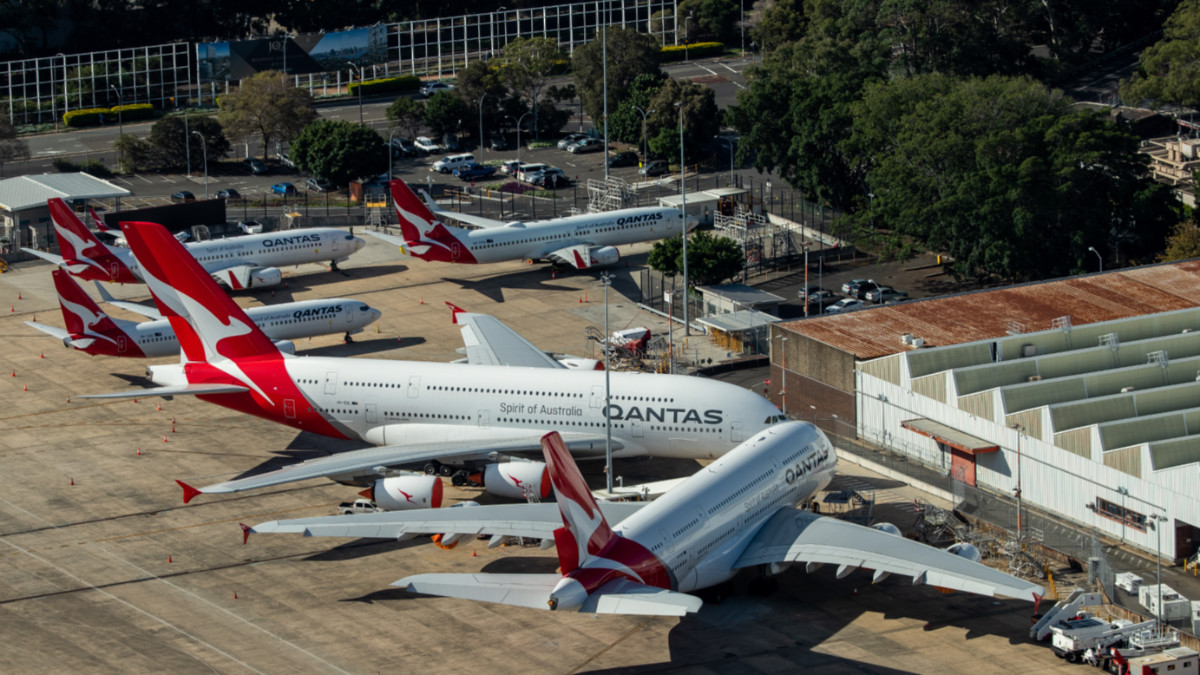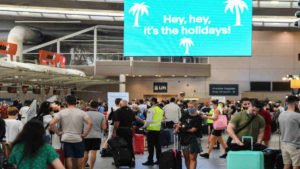Here’s what the Australian travel industry will look like after COVID-19 and what it needs to recover

When these planes return to the skies - the industry will be vastly different (Picture: Getty)
Arguably the travel industry has borne the greatest brunt from COVID-19.
Demand for travel is virtually zero, with governments worldwide shutting their borders and restricting internal movements of their citizens.
Many companies were already reeling from the bushfires but now face the double whammy of the worst pandemic in a century.
In the last six months, the average ASX travel and tourism stock has lost 43 per cent. Even the best performing stock, Reef Casino (ASX:RCT) suffered a 13 per cent decline.
| Code | Name | Price | 6M % Return | Market Cap |
|---|---|---|---|---|
| RCT | REEF CASINO TRUST | 2.04 | -13 | $100.6M |
| EBG | EUMUNDI GROUP LTD | 0.87 | -14 | $36.1M |
| CWN | CROWN RESORTS LTD | 9.355 | -17 | $6.7B |
| SLK | SEALINK TRAVEL GROUP LTD | 3.6 | -28 | $790.6M |
| VRL | VILLAGE ROADSHOW LTD | 2.14 | -30 | $441.2M |
| BYI | BEYOND INTERNATIONAL LTD | 0.7 | -31 | $42.9M |
| CYQ | CYCLIQ GROUP LTD | 0.001 | -33 | $1.9M |
| SGR | STAR ENTERTAINMENT GRP LTD/T | 2.765 | -34 | $2.8B |
| EVT | EVENT HOSPITALITY AND ENTERT | 7.65 | -40 | $1.2B |
| ATL | APOLLO TOURISM & LEISURE LTD | 0.25 | -45 | $50.3M |
| AQS | AQUIS ENTERTAINMENT LTD | 0.012 | -50 | $2.2M |
| ENN | ELANOR INVESTOR GROUP | 0.905 | -57 | $106.9M |
| HLO | HELLOWORLD TRAVEL LTD | 1.84 | -60 | $217.6M |
| IDZ | INDOOR SKYDIVING AUSTRALIA G | 0.005 | -60 | $1.3M |
| WEB | WEBJET LTD | 2.875 | -62 | $1.0B |
| EXP | EXPERIENCE CO LTD | 0.095 | -63 | $52.8M |
| DNA | DONACO INTL LTD | 0.035 | -64 | $28.8M |
| FLT | FLIGHT CENTRE TRAVEL GROUP L | 10.21 | -71 | $2.2B |
A new norm
There is hope that within a few weeks Australians will be able to travel within their own country and this may provide some relief until international tourists are allowed to visit again.
But what will this new norm look like and what will companies, including those listed on the ASX, need to pick themselves up off the ground again?
From speaking to some of these companies and industry bodies it is clear they are already preparing for permanent changes.
But they also say they have been that badly impacted, they will need help to get back on their feet.
More health & hygiene
If there’s one thing similar in overseas jurisdictions where travel has resumed or is planning to be resumed, it’s a greater focus on health and hygiene.
Hotel chain Hilton last week unveiled a new range of elevated hygiene practices.
It’s new “CleanStay” program includes sealing rooms after being cleaned, limiting guest numbers in fitness centres and de-cluttering amenities such as guest directories.
Some airlines, including JetBlue and Emirates, now mandate the wearing of face masks on planes.
Stockhead spoke with Simon Westaway, executive director at the Australian Tourism Industry Council. He doesn’t think we’ll see mandates at a government level but industry providers may ramp up their practices.
“As a general rule our government regulators aren’t that mandatory, but to ensure and encourage [tourists to] return, business will make such offerings,” he said.
Potential things he suggested could happen is a decline (or even death) of hotel buffets, and hand sanitisers being offered on a greater scale.
Travel agents will still be needed
Australia’s travel agents will also likely see change as a result of the pandemic — at least for the medium term. They are already faced with plunging revenues and less face to face contact with clients.
Several of the ASX’s travel agency stocks, from large cap Flight Centre (ASX:FLT) to Helloworld (ASX:HLO), have announced job cuts as opposed to stand downs.
Helloworld said on Friday it expects revenues to be just 5 per cent of pre-COVID-19 levels until September.
Flight Centre has closed more than 50 per cent of its retail stores.
The company has copped criticism over its handling of the crisis including imposing cancellation fees.
It also hasn’t helped that airlines are telling any customers who booked with travel agents to solve it through them.
Zach Griff, analyst for travel website The Points Guy, said last month COVID-19 would also convince people to stop booking most travel through online travel agencies.
A spokesperson for Flight Centre told Stockhead this was a challenging time for the industry.
However, he dismissed the notion it was the end of travel agents and claimed there were just as many good stories as horror stories.
“While we have been dealing with a number of customer complaints around refunds and rebooking, our people have also saved customers time and money in many instances,” he said.
Government help critical
Even when travel is again allowed demand is likely to remain low for some time.
While international tourism is important to the Australian economy, domestic tourism actually delivers a greater cash injection into the economy.
Overall the domestic market accounts for at least 70 per cent of Australia’s tourism industry, according to Australian Tourism Industry Council’s Westaway.
“In estimated terms, the approaching $150bn visitor economy pre COVID-19 was close to $100bn domestic (interstate and intrastate) and around $50 billion for international,” he told Stockhead.
But even when domestic border restrictions are relaxed, it may take some time before Australians start to venture out.
SeaLink (ASX:SLK) CEO Clint Feurehrdt last week called for the government to help stimulate tourism when time was right. And this would not just be marketing but potentially even “consumer-level” stimulus.
“Given it would take an enormous amount of money to subsidise the tourism industry through suppliers, there needs to be a focus on strong Tourism Australia campaigning and consumer level incentives to stimulate the local economy,” Feurehrdt told Stockhead.
“These actions could actively encourage Australians to ‘take a break’, when it is safe to do so.
“A consumer level stimulus could look like a tax incentive for local or domestic travel, and the benefits would be far reaching — not just stimulating the Australian tourism market, but also promoting productivity, and mental health and wellbeing outcomes.”
‘Springboard’ to rebooting visitor economy
With New Zealand likely be the first country opened up to Australians, experts predict this could lead to a “Trans-Tasman bubble”.
Our Kiwi neighbours are consistently among our top two inbound markets.
“International travel will not return for some time but the Trans-Tasman bubble presents an opportunity,” Australian Tourism Industry Council’s Westaway said.
“This is the springboard to assist the reboot of our visitor economy provided there can be a sustainable health envelope over the top of the existing Customs, Immigration and Quarantine (CIQ) arrangements between both countries.”
Bloomberg said last week such a bubble would help both economies. Westaway told Stockhead he shared this sentiment for the travel industry.
Related Topics
UNLOCK INSIGHTS
Discover the untold stories of emerging ASX stocks.
Daily news and expert analysis, it's free to subscribe.
By proceeding, you confirm you understand that we handle personal information in accordance with our Privacy Policy.








